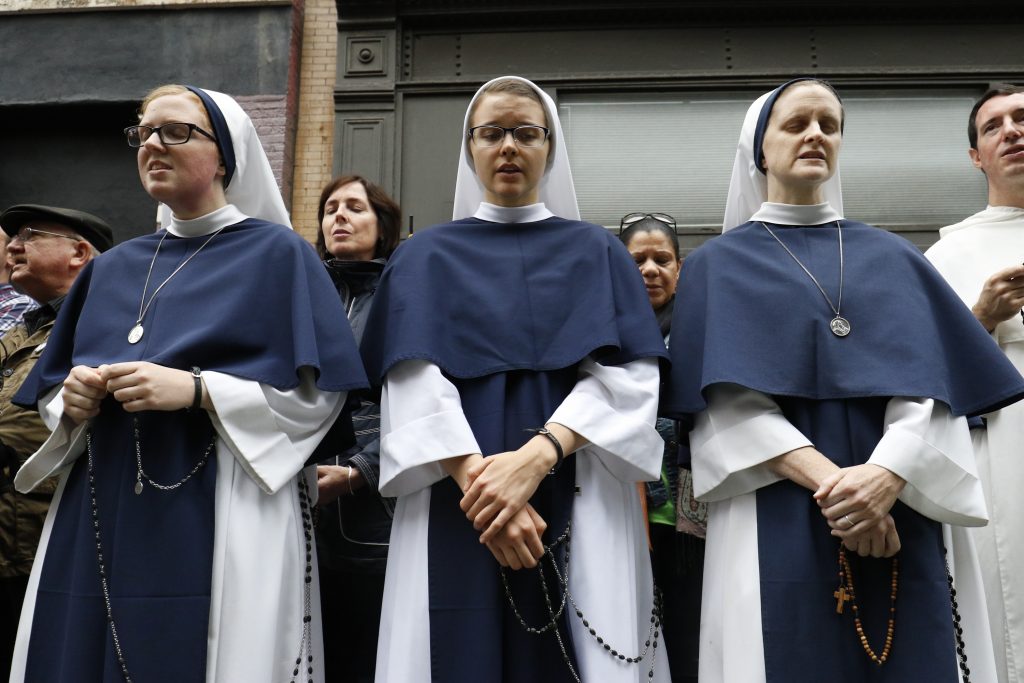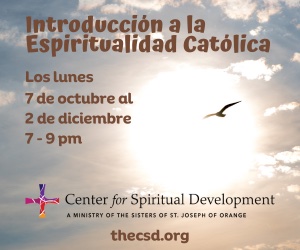Quick: guess what National Review’s Kathryn Lopez “begged” her readers to give her for her (March 22) birthday present?
Did you answer “donations to the Sisters of Life”? You’d be right!
Those of you who know anything about “K-Lo” may have guessed correctly. She’s never too far from the sisters — which, as I know from personal experience, is a wonderful place to be. Though they do face challenges, their order is thriving with a very consistent influx of young vocations and incredible energy and confident sense of mission. As K-Lo describes it:
“The Sisters of Life, as you may know, are women religious who are dedicated to ending abortion in America. They walk with moms. They invite pregnant women into their homes. They love women back to life and are a virtual support emotionally, materially, and of course spiritually to women and their children and families. They also more generally and individually show people they are loved. They try to give people a little glimpse into the love God has for them. Their lives can be heart-wrenching, too, because not all the babies are born. They also work with women in their healing from abortions, sometimes decades later.”
When I read her piece, however, I couldn’t help but think of other orders of women religious who are in a very different place. Only 9% of all Catholic sisters in the United States are younger than 60. Their overall numbers have decreased by a whopping 70% in only the last 50 years.
One big shift is that young women and girls today almost never have the opportunity of decades past to interact with Catholic sisters in the context of Catholic schools. The attractiveness of that life was a recruiting tool that basically no longer exists. I’ve encountered this reality in my own life as, when it came time to look around for places to educate my children, I came to the heartbreaking realization that I wouldn’t be able to give them the same gift my parents gave me: the chance to be educated by Catholic sisters.
Can this trend be turned around? Could there ever be a revival of women religious in the United States? It may seem difficult to imagine, but there are two good reasons to think that it is possible.
First, though they are dramatically worse today than they were in the 1970s, numbers of Catholic Sisters in the U.S. today aren’t that far away from where they were at the beginning of the 20th century. There are historical ebbs and flows. We are in a clear low point now, but this could change.
Second, the success of orders like the Sisters of Life prove that it can be done, even in today’s secularized and even irreligious culture. When the need is great, and the mission clear, this order flourished, is flourishing, and will flourish for the foreseeable future.
In my most recent book, “Losing Our Dignity: How Secularized Medicine is Undermining Fundamental Human Equality” (New City Press, $21.46), I argue that the crisis of eldercare — and particularly of dementia care — will require an “all hands on deck” approach from the Church. We already refuse to put the resources into caring for this population as we should, even regularly employing off-label use of antipsychotics to put people with dementia in “chemical straightjackets.”
This population will double in 20 years and will triple in 30 years. My book calls the Church to a massive response of compassionate care in the midst of a throwaway culture that will consider this population to be “human non-persons.” This, I write, will need to include the retooling of current religious orders and also the creation of new orders.
Is this kind of revival unrealistic?
I don’t think so. Again, the Sisters of Life show that when an order responds to the signs of the times and has a clear and urgent mission in mind they can flourish, even in the secularized West.
But it may require many of us, as fathers and mothers of daughters, to rethink how we parent. We must, for instance, find creative ways to expose our daughters to the lives of Catholic sisters so they can imagine what this life could be like. And, of course, we must encourage our daughters when they get such a calling from the Lord.
Or at least not discourage it. Grandchildren are a blessing, of course, but our children following God’s call takes priority, right? Right! (Says the father of two girls, 23 and 16, who does want to be blessed with grandchildren.)
Let us pray for the strength, both as individuals and as a Church, to welcome the call of our young women to join the religious life. God will do the calling, but it is up to us — all of us — to help facilitate the response.

